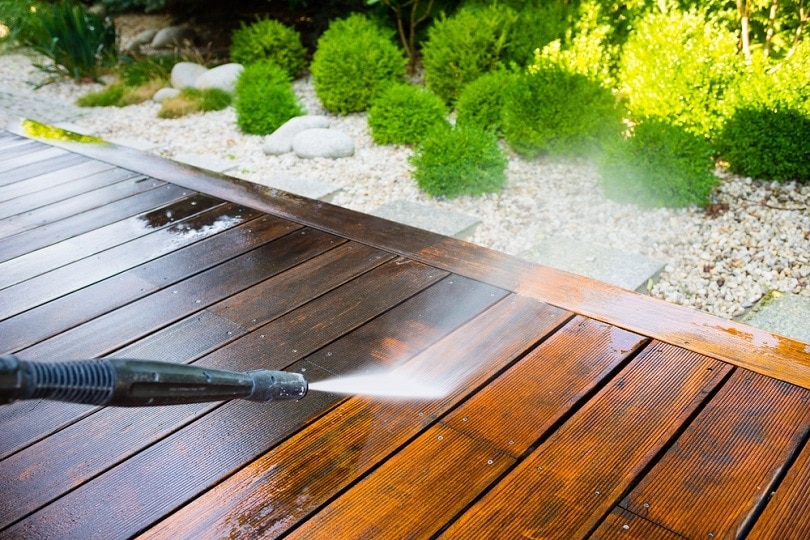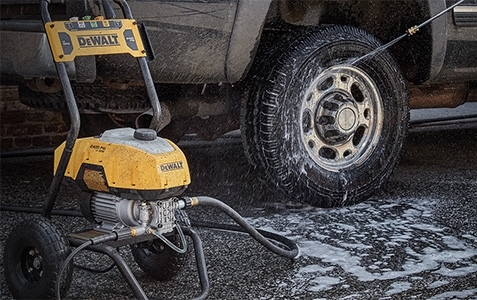Cold vs Hot Water Pressure Washing – What To Choose?
-
Pete Ortiz
- Last updated:

If you are new to pressure washers, then the distinction between cold water and hot water models may seem very nuanced and unimportant. However, water temperature dramatically affects the cleaning powers of your pressure washer.
For example, hot water can cut through grease and grime, while cold water simply moves those substances around. For this reason, cold water pressure washers and hot water pressure washers are very different from one another.
If you want to learn more about these two types of pressure washers, read on. We provide an overview of both types, help you determine which one you need, and explain essential ratings related to both.
Overview of Cold Water Pressure Washers
Between the two pressure washer types, the cold water pressure washer is the most popular because it is more affordable, compact, and versatile. They also require less maintenance, which is ideal for someone with little knowledge of the tool.
How They Work
Cold water pressure washers will either be powered by gas or an electric motor. Regardless of the fuel type, it will activate the pump so that the water supplied to it can be projected forcefully.
Because of the pressure’s power, the water can dislodge a variety of substances like dirt, dust, light mud, and debris. You can think of a cold water pressure washer as being more like a high-pressure shower in that it forces the debris off the surface by pressure alone.
Cleaning Power
For many cleaning jobs, especially personal uses around the home, a cold water pressure washer provides ample cleaning power. Most dirt and dust are no match for any pressure washer, cold or hot. This is especially true if you add soap or a cleaning solution to the pressure washer.
For more intensive cleaning purposes, like commercial use, cold water pressure washers may not fit the bill. Because of the cold water used within this device, it will not cut through grease, oil, or grime. Instead, the pressure will simply push the materials around.
Versatility
Because of the cold water used in the system, cold water pressure washers are highly versatile. You can use them on concrete, cars, stone, and many other hard surfaces.
Some models will even come with nozzle heads and other features. These nozzle heads mean that you can tailor the angle of the water and pressure to the job you are working on, making the pressure washer more versatile and useful for individual purposes.
Price
Generally speaking, cold water pressure washers are less expensive than hot water ones. The reason for this is that they do not include a heating element like hot water models. They are often smaller too, which means they have even fewer materials in their general build.
Cold water pressure washers flood the market, meaning that you can find washers of nearly any price. If you do enough digging, you will likely find a cold water pressure washer that works effectively and fits your budget.
Looking for a Budget Pressure Washer?
Best For
Cold water pressure washers are best for people on a budget and who intend to use their pressure washer around the house. Although these models are less effective than hot models, the pressure is strong enough for most personal uses, and it will save you a bit of storage space and money.
- Affordable
- Versatile
- Has a wide price range
- Best for general cleaning purposes
- Cannot dissolve grease
- Not typically suitable for commercial use
Overview of Hot Water Pressure Washers
Even though cold water pressure washers are more popular than hot water ones, hot water pressure washers definitely have their place in the market. Their hot water makes them more effective for cleaning grease and oil, so hot water pressure washers are a favorite among professionals.
How It Works
Just like cold water pressure washers, hot water models use a pump and fuel source to create pressurized water. This pressurized water can physically dislodge dust, dirt, mud, and other particles from a surface.
In addition to the pump, however, hot water pressure washers also have a heating element within the system. This heating element heats the water so that the washer’s water is hot enough to dissolve grease and cut through different oils.
Since hot water pressure washers include an additional element, they are often much bigger and bulkier than cold water ones. Though this isn’t much of a concern if you have ample storage space, you should definitely think twice about your pressure washer size if you are tight on storage area.
Cleaning Power
Hot water pressure washers have impeccable cleaning powers. Because of their water pump, they have the same pressurized course as cold water systems. This allows them to dislodge dirt and other particles from the surface of different materials.
In addition to particles’ physical dislodging, the hot water dissolves grease, oil, and grime. As a result, hot water pressure washers have more impressive cleaning powers than cold water ones. They don’t just move around grease. They actually dissolve it to clean the surface entirely.
Although many amateurs don’t need the full cleaning power of hot water pressure washers, professionals will benefit from this model’s additional cleaning power.
Versatility
Because of the increased cleaning power of hot water pressure washers, they are a little less versatile than the cold models. The hot water can be a bit more damaging if used on plastic or other materials that can melt or break under the intense temperature.
When using a hot water pressure washer, you need to be much more careful about what it hits. The hot water can cause severe burns in addition to wounds from the pressure.
Price
Hot water pressure washers tend to be a bit pricier than their cold water counterparts, but they also come in a wide range of prices. Expect to pay a little more for a hot water model simply because of the additional parts and materials used.
Still, you don’t have to pay for the most expensive model on the market. Since some hot water pressure washers are designed for commercial use, they will offer more power and high temperatures than most amateurs will ever need.
Best For
The hot water pressure washers are best for intense cleaning purposes and commercial use. The combination of hot water and pressurized force makes this tool highly useful for dislodging debris and dissolving any grease, oil, or grime that’s on the surface.
You might not want to opt for the hot water pressure washer if you want to clean off softer surfaces or materials that are prone to melting. Additionally, you might want to forgo this option if you don’t anticipate cleaning surfaces with a lot of grease.
- Highly powerful
- Suitable for commercial use
- Strong enough to dissolve grease and oil
- Has a wide price range
- More expensive
- Not as versatile
Which to Get?
Both hot water and cold water pressure washers are useful, but you should select a model based on your intended uses. You should get a hot water pressure washer if you need to cut through grease and oil, but the cold water pressure washer will be suitable for any other job.
If you want a pressure washer for future use but don’t know what you’ll be cleaning, I suggest getting the cold water pressure washer. It is powerful enough for most cleaning purposes, and it will save you some money.
On the off chance that you anticipate using this tool for commercial use sometime in the future, then you might want to go ahead and opt for the hot water pressure washer instead. The hot water pressure washer is more powerful and better for commercial use than the cold water models.
What Temperature Should Hot Water Pressure Washers Be?
The exact temperature for a hot water pressure washer will depend on the model you select. The hotter the water, the more easily it will be able to cut through grease and oil. More intensive purposes will require a hotter temperature than those with lesser cleaning needs.
You should generally look for hot water pressure washers that can get up to around 200 degrees Fahrenheit. At around this temperature, the water can dissolve grease. Any models that are substantially cooler than this will not adequately be able to cut through the oil.
In contrast, models that are substantially hotter than 200 degrees Fahrenheit run the unnecessary risk of burning you and melting other substances. So, you should probably look for models that can heat water between 200 degrees Fahrenheit and 250 degrees Fahrenheit.
Important Ratings to Know
When looking at any type of pressure or power washer, there are often three ratings that will come up in the description: pounds per square inch, gallons per minute, and cleaning power units. You should assess the effectiveness of a model based on these ratings.
Pounds Per Square Inch (PSI)
The pounds per square inch rating tells you how many pounds of pressure is extracted per inch. You can think of this rating as telling you the cleaning force behind the pressure washer. More powerful pressure washers will have a higher PSI rating.
Gallons Per Minute (GPM)
The gallons per minute rating denotes the water volume. This is the rating that tells you exactly how much water leaves the unit per minute. The more water that leaves the unit, the more the pressure washer can clean. On the flip side, too much water is difficult to manage.
Cleaning Power Units (CPU)
If you don’t look at any other rating, you need to check out the cleaning power unit rating. This rating tells you how effective the pressure washer is at cleaning. CPU is calculated by multiplying the PSI by the GPM. The higher both of these ratings are, the higher the cleaning power unit will be.
Conclusion
Both cold water pressure washers and hot water pressure washers are great for cleaning dirt and debris off different surfaces. Because of the heating element within hot water models, however, these options can dissolve grease and oil, making them better for intensive cleaning.
Still, cold water pressure waters are strong enough to clean most items around the house. Unless grease is involved, the pressure provided in cold water models is more than enough for getting the cleaning job done.
- See Also: 9 Best Budget Pressure Washers under $200 – Reviews & Top Picks
- See Also: 10 Best Pressure Washers under $300 – Reviews & Top Picks
Featured Image Credit: bubutu, Shutterstock
Contents






